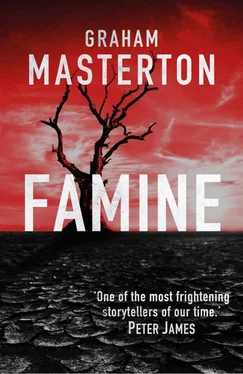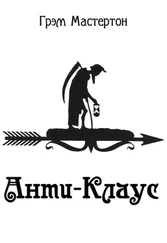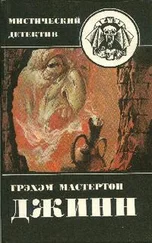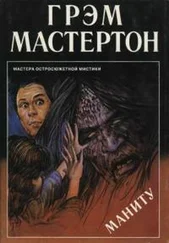Thursday was the day that most newspapers stopped printing, that the last few gas stations closed down, that power blackouts began to darken thousands of square miles of the eastern seaboard. There was a terrible wildness in the air, a terrible panic, that nobody who lived through the first days of the famine could ever forget. One journalist remembered climbing Coit Tower in San Francisco and staring out for hours over a city that ‘flowered with foes, and echoed with shots, and howled with the sirens of the helpless police.’ Above everything, though, he said ‘I could hear the cries and shrieks of a people who felt as if they had been abandoned by democracy, abandoned by capitalism, abandoned by peace, and abandoned by plenty… a people who more than anything else felt they had been deserted by God.’
During Thursday, the phone rang again and again at the Snowmans’ house on Topanga Canyon. Nobody answered it until late on Thursday evening, when a motorcycle cop who had been checking houses for squatters and looters picked it up and said, ‘They’ve all gone. This is the police.’
‘Are they all right?’ asked the voice at the other end.
‘Who knows, friend? We’ve got chaos here, a bad brush foe burning. They could be anyplace at all.’
‘Nobody’s left a forwarding address?’
The cop gave a cursory look around. ‘Not that I can see,’ he said. ‘It looks like they just lit out. They didn’t even lock the doors.’
There was a pause, and then the voice said, ‘Can you do me a favour?’
‘Sure, you name it.’
‘Can you write on the wall someplace that Ed Hardesty called, from South Burlington Farm in Kansas, and that I’m going to try to make my way to LA?’
The cop took out his pencil and jotted the message down. ‘South Burlington?’ he asked.
‘That’s right.’
‘Okay, then, I got you. I’ll do that.’
‘Thanks a whole lot. If this situation ever mends itself, come around to the house you’re at and claim yourself a case of whisky.’
The cop grinned. ‘To tell you the truth. I’m a vodka man.’
Ed carefully set the telephone back in its cradle, and looked across the living-room at Karen. Then, while she watched him, he stood up and walked to the window, staring out at the front yard of South Burlington Farm the same way he used to when he was a boy.
‘Well?’ asked Karen. ‘Weren’t they there?’
‘That was a cop,’ Ed told her, taking out a cigarette and lighting it slowly. He breathed out smoke. ‘He said the house was empty. Even the doors had been left unlocked.’
‘They’ve probably gone to stay somewhere safer,’ Karen suggested. ‘The way I heard it on the news, a whole lot of people are banding together to protect themselves from looters, and Hell’s Angels, and people like that. Maybe they’ve found some kind of sanctuary.’
Ed leaned against the window-pane. Outside, the sun was gradually eating its way into the roof of the stables opposite, and the sky had flushed the colour of ripe strawberries. To a city dweller, an evening like this on a Kansas wheat farm would have looked idyllic. To a farmer, the overwhelming silence, right in the peak of the early harvesting season, was ominous. The tractors were all parked and covered with tarps; the stables were empty and quiet. A single door banged and banged in the warm breeze that had risen on the prairie.
‘I used to believe that this was God’s own country,’ said Ed. ‘Now I’m not so sure.’
Karen said nothing, but came across to stand beside him. She was wearing a pale blue blouse that belonged to Season, and a pair of Season’s baggy denim jeans. Her hair was drawn back, the way Season often drew hers back, and tied with a ribbon.
‘You’ll find them,’ she said, gently. ‘You know you will.’ Ed looked at her. ‘Yes,’ he said, unconvinced.
At that moment, Della came down from the bathroom, showered and smelling of Goya talcum. She had dressed herself in one of Ed’s green gingham shirts, with the sleeves rolled up, and the front unbuttoned right the way down to her navel. She had washed her hair, and it was wet and combed Sha-Na-Na style.
‘I just looked in on Shearson,’ she said. ‘He’s sleeping.’
‘Again?’ asked Karen.
‘I think he’s trying to retreat from reality,’ Della remarked. She went to the cocktail cabinet and, uninvited, poured herself a bourbon. Ed said, ‘Help yourself to a drink,’ but his sarcasm didn’t faze her in the least. She came to the window and possessively curled her arm around his waist, and kissed him on the cheek. Karen gave them both a tight lemon-at-the-party kind of a smile.
‘Shearson can’t imagine a world without food,’ said Della. ‘Therefore, he’s decided to withdraw from it completely until it all gets back to normal. If this famine goes on, he’ll probably sleep like a baby until he dies of starvation in his bed.’
‘How’s Peter?’ asked Karen.
Della swallowed bourbon. ‘Peter’s okay. I think he’s got used to the idea that he’s going to be better off if he cooperates. Peter’s enough of a political manager to know what kind of a jam he’s in. In his case, I think a little plea-bargaining is going to go a long way.’
‘You still think you’re going to be able to bring Shearson to court?’
‘I don’t know,’ said Della. ‘But until I get orders to the contrary, he’s under arrest charged with fraud and misappropriation of funds and more federal bank offences than you can mention. And that’s the way it’s going to stay.’ Peter Kaiser appeared in the doorway, dressed in an ill-fitting short-sleeved shirt in bright orange, and a pair of creased khaki slacks that were too wide around the waistband and three inches too short around his ankles. ‘Well, well,’ said Karen. ‘How’s Waikiki beach today?’ Peter didn’t even answer. He sat himself on the end of the sofa, clutching himself as if he was beginning to feel the cold, and looked steadfastly miserable.
‘You want a drink?’ asked Ed. ‘There’s some bourbon left, or a little sherry.’
‘No. No, thanks,’ Peter told him.
Della said, ‘You’re not in cell block eleven yet, Peter. Don’t look so unhappy.’
Peter looked up. ‘You think I’m unhappy because of that? You think your half-assed threats of arraignment mean anything at all? You can stick your arraignment, right where the camel stuck his dates. I’m worried about my mother, if you must know. I tried to call her this morning, but all the lines to Washington are out.’
‘I got through to LA just now,’ said Ed. ‘Maybe they’re only out for an hour or two.’
‘What do you care?’ asked Peter.
Ed stared at him. ‘I care because I have people of my own to think of, just the way you’re thinking about your mother. Now, have a drink, for Christ’s sake, and stop looking so damned depressed.’
They had been staying at South Burlington Farm since early Tuesday afternoon, and the tension between them hadn’t been improved by the rapidly-worsening famine bulletins on the television. There was sufficient canned and frozen food at the farm to keep them going for another week or two, if they were lucky, but after that they knew they were going to be out on their own. They had hoped to be able to stay for a month, but the President’s announcement on Wednesday evening had meant that over sixty per cent of their food had had to be thrown away. Ed had opened all the suspected cans and dug the food into the ground, in case they were tempted to open them later, when they were hungrier, and far less anxious about the risks of botulism.
On Tuesday morning, after capturing Shearson, they had stopped just outside of Fall River at a roadside diner, where Della had put in a call to the FBI office in Wichita. There had been no reply, she said; so she had tried calling Kansas City. The bureau chief there had told her not to risk bringing Senator Jones across country to Kansas City until the famine situation had ‘normalised itself. He had warned her not to try handing him over in Wichita, either since there had been fierce demonstrations and looting in the centre of town, and the Mayor had declared an area bounded by 13th Street to the north. Hillside Avenue to the east. Pawnee Avenue to the south, and the Highway 81 bypass to the west, totally under 24-hour curfew and a shoot-on-sight regulation for anyone found on the streets.
Читать дальше










